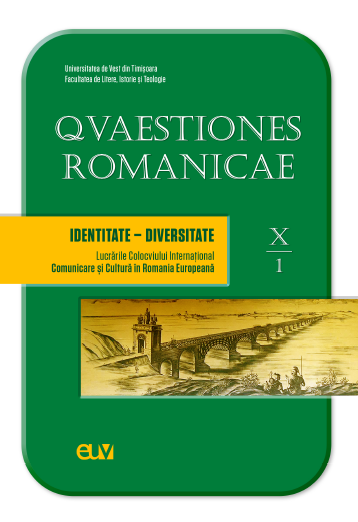Cosmicitatea iubirii în elegia erotică latină şi suprarealism
Abstract: (Love’s Cosmic Nature in Latin Erotic Elegy and Surrealism) Space of the discursive birth of the ego following a cosmogonic model (implying an agon of desire, but also the agony of extinction, which, in Heroide, acquires apocalyptic proportions), the Latin erotic elegy exposes an anatomy of love with an archetypal substrate, the conciliation of psychic opposites (coincidentia oppositorum) via disconcerting sensory and emotional operations evolving into the turntable of subjectivity. The erotic internalisation of the antiquity structure (with its specific representations of the limit, measure, proportion, insecurity of confrontation and securing conciliation) makes the ego arise as a cosmic event or a subjectivation of the cosmos, transferring the pattern of order and disorder to the elegiac love. Always balanced between the self and the other, in a vertigo of collapses and triumphs, this in-love-ego experiences amplified crises as fullness; thus, love becomes a kind of a total object of the unconscious (world-making and world-collapsing alternating in erotic agony). It is precisely the fullness of elegiac love (internalized construction of the cosmos) that forms the link with the capital, full, mad love of the surrealists, at the end of the history of modern subjectivity. The inexplicable magnetic surreal love (coup de foudre), with the suite of Destiny coincidences and objective chance, puts into crisis the entire psychic universe (which, through successive historical elaborations of subjectivity, ends up substituting the ancient outer cosmos), reflecting (or illuminating) an anatomy of desire similar to that of the elegiac: the archetypal eroticized and sustained antagonisms (animus-anima) oscilate in this full love through a subtle web of energies released as a result of the exploding psyche.
Keywords: subjectivity, desire, psychic universe, cosmos, antagonism.
Rezumat: Spaţiu al naşterii discursive a eului după un model cosmogonic (implicând un agon al dorinţei, dar şi o agonie a stingerii, care în Heroide dobândeşte proporţii apocaliptice), elegia erotică latină expune o anatomie a iubirii cu substrat arhetipal, concilierea opuşilor psihici (coincidentia oppositorum) prin operaţii senzoriale, emoţionale deconcertante devenind placa turnantă a subiectivităţii. Interiorizarea structurii lumii antice în erotism (cu reprezentările sale specifice asupra limitei, măsurii, proporţiei, insecurităţii confruntării şi concilierii securizante) face ca eul să survină ca un eveniment cosmic sau ca o subiectivare a cosmosului, transferând iubirii elegiace tiparul ordinii şi dezordinii. Mereu balansat între sine şi celălalt, într-un vertij de prăbuşiri şi triumfuri, eul acesta îndrăgostit trăieşte crize amplificate sub forma totalităţii, astfel încât iubirea devine un fel de obiect total al inconştientului (faceri de lumi şi prăbuşiri de lumi alternând în agonul erotic). Tocmai totalitatea iubirii elegiace (construcţie interiorizată a cosmosului) constituie liantul cu iubirea capitală, totală, nebună a suprarealiştilor, la capătul istoriei subiectivităţii moderne. Inexplicabila iubire suprarealistă magnetică (coup de foudre), cu suita coincidenţelor destinale şi a hazardului obiectiv, pune în criză întregul univers psihic (construcţia subiectivităţii substituind exterioritatea cosmosului antic prin elaborări succesive), reflectând (sau iluminând) o anatomie a dorinţei similară aceleia elegiace: antagonismele erotizate şi susţinute arhetipal (animus – anima) sunt conciliate în această iubire totală printr-o complexă ţesătură de energii eliberate ca urmare a explodării universului psihic.
Cuvinte-cheie: subiectivitate, dorinţă, univers psihic, cosmos, antagonism.
